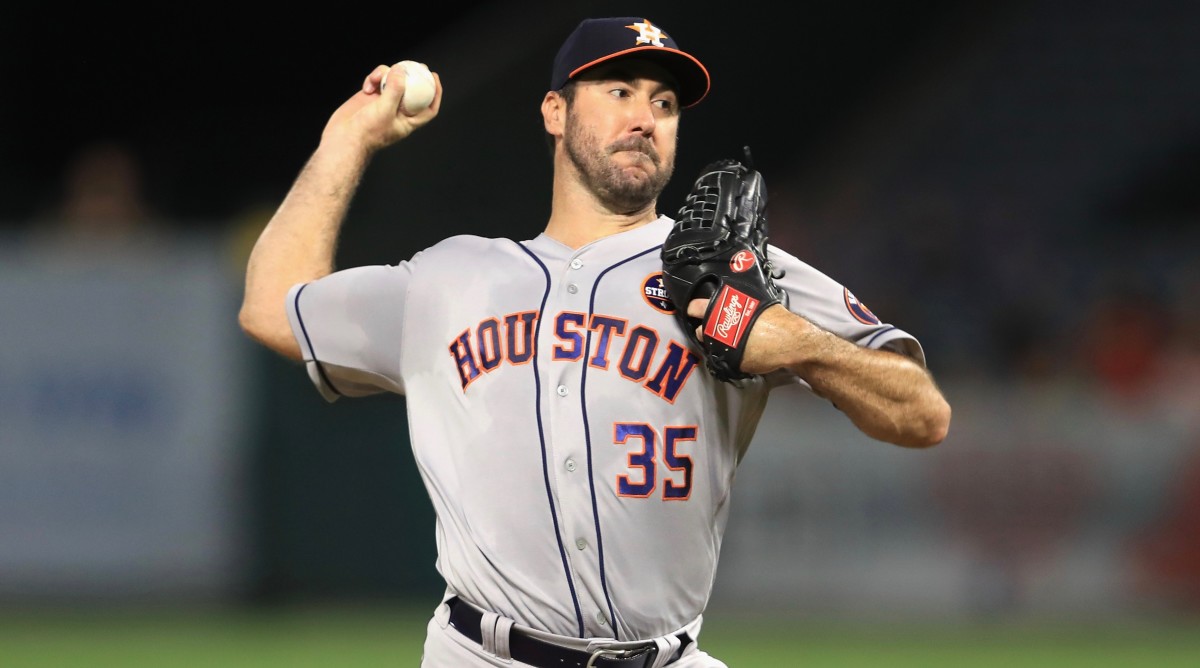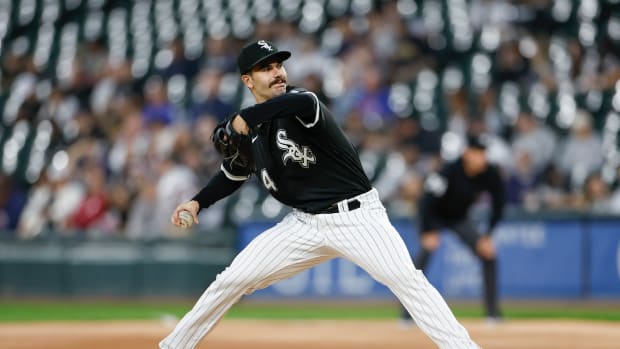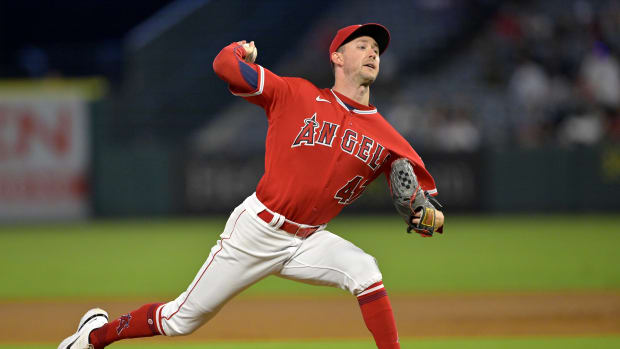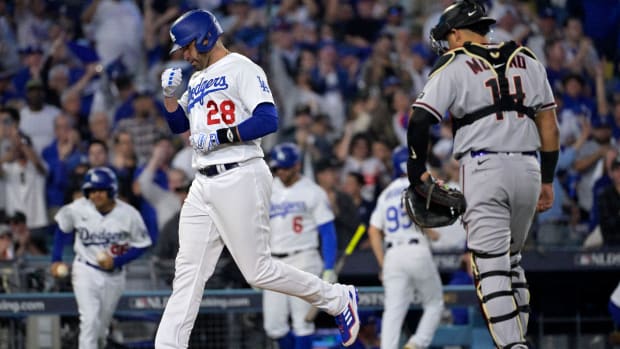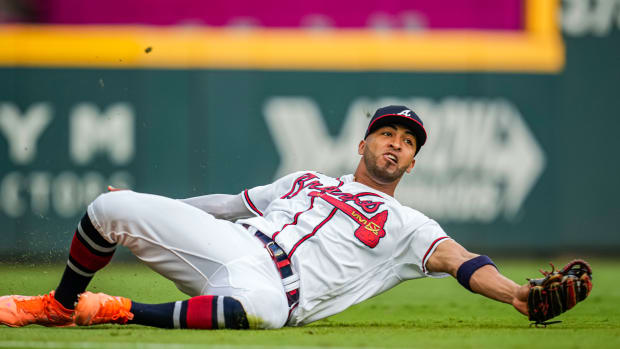The Astros' Justin Verlander Trade Violated Their Philosophy ... And May Win Them the Pennant
Among the least consequential effects of Hurricane Harvey, which tore through Texas in the last week of August, was that it nearly scuppered the biggest trade of this baseball season—the type of deal the analytically driven Astros weren’t supposed to make.
On Aug. 25, Jeff Luhnow, the Astros’ 51-year-old general manager, left Houston with his wife, Gina, and their three-year-old son, Henry, to accompany the club on a three-game road trip to Anaheim. He had moved his furniture to the second story of their house near Rice. They stayed with Gina’s parents, in west Los Angeles, but he intended to return to Houston and hunker down with his front office before the waiver-trade deadline, midnight EDT on Aug. 31. It was, in some ways, the most important deadline of his six years as a GM.
The Astros lost 100 games in each of Luhnow’s first two seasons, as he initiated a rebuilding effort remarkable for its depth and controversy. Just four years later, as the Angels series began, Houston had the AL’s best record, at 77–50. Still, Luhnow needed reinforcements, particularly on the mound. While he had come close to acquiring at least two star relievers at the non-waiver trade deadline a month before, he had emerged with only a middling one, Francisco Liriano. Rival GMs and baseball analysts assailed him for being too attached to his prospects, and players expressed frustration at his inaction. As No. 1 starter Dallas Keuchel put it, “Disappointment is a little bit of an understatement.”
But Luhnow wasn’t through. As he watched topflight pitchers debut with their new, contending teams—Yu Darvish with the Dodgers, Sonny Gray with the Yankees, José Quintana with the Cubs—he kept his eye on the most significant midseason prize of all: Justin Verlander, the Tigers’ 34-year-old ace.
The Astros Are Surging Toward October and Justin Verlander Is Leading the Way
Luhnow had first talked about Verlander with Al Avila, his counterpart in Detroit, in July, but they hadn’t come close to a trade. Then things started to change. After a rocky few months Verlander, the AL’s Cy Young winner and MVP in 2011, had recaptured his old dominance for the rebuilding Tigers, going 4–1 with a 2.36 ERA in his last six games. That—along with a rash of Astros injuries—made Luhnow more willing to sacrifice top farmhands to get Verlander despite the two $28 million years left on his contract.
The GMs discussed dozens of potential permutations. In Luhnow’s estimation, the chances of acquiring Verlander fluctuated from as high as 70% to as low as 5%. By the month’s final week he felt his odds were good if he made a final push with the help of his assistants, scouts, analysts and medical staff. As it did for so many Houstonians, often in far more meaningful ways, Harvey altered his plans.
****
While his house was undamaged, Luhnow couldn’t get home; the airports were closed. So, as his club flew to Tampa to play a relocated series against the Rangers, he stayed in L.A. to negotiate from one of the only spots in his in-laws’ house that receives strong cell service: the dining room table.
As Luhnow’s son and two young relatives ran screaming circles around him, and he tried to clarify what was happening—“It took me a while to explain to my in-laws that there are kind of two trading deadlines,” he says—he did his best to keep in touch with Avila. By the morning of Aug. 31, though, he felt the probability of an agreement was so low that he scheduled other activities: an appearance at his 11-year-old nephew’s Little League practice, then a date with Gina.
The scene in Detroit was more standard. Avila had invited six members of his front office to his house to dine on seafood and yellow rice, his wife’s specialty. They discussed the circumstances under which they would still trade Verlander, their ace for a dozen years. It would take as much in prospect value as Luhnow had ever relinquished. “We genuinely love Justin Verlander,” Avila says. “Part of us wanted him to stay here and finish his career.”
At 5:30 p.m., 3 1⁄2 hours before the deadline, Luhnow arrived at his nephew’s ball field, the same one on which The Bad News Bears was filmed. As he approached the diamond, his cellphone rang. It was Avila. The potential for a Verlander trade was not only back on; it was higher than it had been at any point in the last two months. Still, Luhnow had a promise to keep. As his mind raced, he addressed a dozen rapt middle schoolers and their coach about the importance of practice. When the event concluded, he sped back to his in-laws’ house.
He got there at 7:45—75 minutes before the deadline—and found it filled with people. He had forgotten that Gina’s parents were hosting a dinner party. After a quick explanation—two deadlines!—he rushed upstairs to take what he had intended to be the fastest shower of his life. With the water running, his phone, which unexpectedly had found a signal, rang again. Avila. “We agreed on the deal—the money, the players,” Luhnow says. Houston would part with a trio of minor leaguers: outfielder Daz Cameron, catcher Jake Rogers and pitcher Franklin Perez, a top Astros prospect who had been off the table in every other potential deal. Avila, reportedly, agreed to pay $8 million per year of the salary still owed Verlander. “His owner approved it, my owner approved it,” recalls Luhnow. “I was absolutely thrilled.”
There was just one problem. “Have you talked to Justin?” Luhnow asked Avila. Verlander had a full no-trade clause and had indicated that he wanted to go to the Cubs or the Dodgers.
“I’m going to call him now,” Avila said, “and we’re going to send somebody over there.” In fact, Avila—who had mentioned Houston to Verlander but hadn’t received an answer on whether he would agree to relocate there—had already dispatched two staffers to sit parked outside the pitcher’s apartment. They had with them, just in case, the documents Verlander would need to sign to waive his no-trade clause.
After his shower, Luhnow went back downstairs to reclaim his cell-friendly spot at the dining table, which was now set for the dinner party, to ensure that everything from the Astros’ side—forms, medical approvals—was in place. Avila called 25 minutes before the deadline. “Justin has not approved the deal,” he said. “It’s not clear which direction that’s going to go.”
The dinner guests were filling their plates with food from the kitchen buffet and settling in around Luhnow. “We’ve got four minutes left!” he shouted into his phone to his staff, drawing quizzical glances from the diners. “We’ve got to do this now!”
By 9 p.m. PDT—midnight EDT—Luhnow still didn’t know if Verlander had agreed to become an Astro. He did the only sensible thing: went on his date with Gina. Finally, at 9:14, as they sat down at a nearby restaurant, he got a call. It was an executive from the league’s office in New York City.
“The deal’s been approved,” the executive said. “But, Jeff, don’t ever put me through that again. We received final verification from Verlander at 11:59 and 58 seconds.”
In the morning, Luhnow would speak to his new starter. For now, though, Luhnow ordered a Tito’s vodka and soda, with lime. With two ticks of the clock to spare, and despite obstacles both contractual and natural, he had pulled off a trade that might propel his Astros to a long-awaited championship. But he’d also done something else.
****
Rivals around baseball have often accused Luhnow, a former management consultant, of being too slavish to his sophisticated forecasting models, which place a premium on young, inexpensive talent. Prospects, in other words. “They don’t give up anything in deals,” an opposing GM complained of the Astros earlier this season. For Verlander—an older pitcher making a lot of money—Luhnow had sacrificed potentially 18 controllable seasons from future contributors. If it wasn’t the first move he had made contrary to his data, it was, without a doubt, the most prominent.
“The reality is that any economic modeling that includes projections is not going to like a deadline deal, where you’re trading what could be an enormous amount of future value for a decent amount of present value,” says Luhnow. “The math does not support these types of deals. It’s a matter of using your best judgment.”
Astros' AL West Title Serves as Reminder They Could Still Be Baseball's Best Team
The past six years have confirmed for Luhnow and his staff that while their probabilistic models are useful, they are not infallible. “If anybody tells you they have an idea of what the future looks like, don’t believe them,” says Sig Mejdal, the former NASA engineer who has long been Luhnow’s chief data man. (His title is Special Assistant to the GM, Process Improvement.) “The future is a lot weirder than we can imagine.”
In June 2014, when the Astros were still viewed as a laughingstock run by know-it-all baseball outsiders, Sports Illustrated put the young outfielder George Springer on its cover with a boldly predictive billing: YOUR 2017 WORLD SERIES CHAMPS. The story described the club’s attempt—after shedding all their expensive assets and starting from scratch—to find success with a mix of traditional scouting and cutting-edge analysis. That Houston made the playoffs in 2015 and is currently a leading contender to win this year’s World Series suggests that everything has gone as planned. It has not.
In fact, in the months after that SI issue, nothing seemed to go right. The Astros’ top prospect, Carlos Correa, spent the second half of the season on the bench with a broken leg. Springer landed on the DL. Their proprietary database, Ground Control, was revealed to have been hacked—by, it turned out, Chris Correa, a former coworker of Luhnow’s and of several other Houston executives when they were all with the Cardinals. Correa is now serving a 46-month prison sentence for unauthorized access of a protected computer. Luhnow failed to sign the No. 1 pick in the 2014 draft, lefthander Brady Aiken, after the club detected an issue with Aiken’s elbow and decreased its offer to him. One of their minor league stadiums flooded, and another caught on fire.
Their assessment of their own players has also been imperfect, as they freely admit. “When we arrived, Dallas Keuchel was throwing 87 and walking more than he struck out,” says Mejdal of the 2015 Cy Young winner. “Who would have thought he would turn into this?”
Additionally, says Mejdal, “if we ever catch ourselves feeling smart, all we have to do is turn on SportsCenter.” There, as often as not, they can catch Diamondbacks outfielder J.D. Martinez hitting another home run—the same J.D. Martinez whom Houston cut outright in March 2014. Since then he has an OPS (.930) higher than all but six other hitters in the majors. “He’d told us he’d made some changes to his swing that offseason,” says Luhnow, sheepishly. “We didn’t give him enough at bats in spring training to show us. Literally four days after we released him, he’s playing on a back field in Kissimmee against the Astros’ Triple A team and he hits three home runs. It was like, What did we just do?”
How Byron Buxton Shed a Crippling Slump To Help Push the Twins Toward the Playoffs
Of course, many of their decisions have gone right. Such as drafting Correa—Carlos, not Chris—with the top pick in 2012, which not only gave them a star shortstop but also the financial room to choose starter Lance McCullers, now an All‑Star, 41st overall. And entrusting the team’s future to Springer and second baseman José Altuve, who is an MVP candidate. And declining to sign Aiken—who would indeed blow out his elbow nine months after the draft—and thus receiving a compensatory pick that they would use the next year on third baseman Alex Bregman, who now has a big league career WAR of 5.2, nearly double that of any other player drafted in 2015.
So far, Verlander has been better than the Astros could have ever imagined. Through Sunday he had made three starts, in which he’s allowed a total of two runs while striking out 26. They were all wins—including Sunday’s, which clinched Houston’s first division title in 16 years. But even the Astros—who have endeavored to turn the art of decision-making into a science, and become winners in a time frame that few found realistic—have relatively little idea if he’ll hold up, even through his next start. Sometimes, you measure a dozen times, cut once, and still fail. Sometimes, you make a multimillion-dollar deal from your in-laws’ dining table, bucking your own data, and it works. “We felt he was going to get them to the World Series and win it—and then they’re going to have a really solid pitcher for two more years,” says Avila. That’s the Astros’ plan, best laid as it is.






























